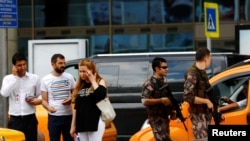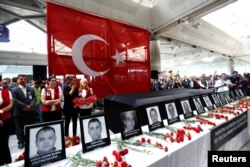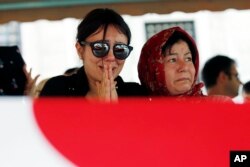Turkey says the three suicide bombers who carried out the deadly attack on the Istanbul airport were from Russia, Uzbekistan and Kyrgyzstan.
Turkish officials continue to believe the attack was launched by Islamic State fighters, but did not name the bombers, who authorities say fired assault weapons at travelers and workers Tuesday at Ataturk International Airport before blowing themselves up.
The death toll from the blasts at Europe's third busiest airport increased to 44, while more than 230 others were injured in the attack.
Police raids
Police conducted raids on 16 locations in three Istanbul neighborhoods Thursday, arresting 13 people suspected of having links to Islamic State.
In addition, the state-run Anadolu Agency said authorities arrested nine people in the western coastal city of Izmir accused of having links to Islamic State fighters in Syria that included support for the group's finances, recruiting and logistics.
Prime Minister Binali Yildirim said Wednesday the investigation is ongoing, but evidence points to Islamic State, though the militants have not claimed responsibility. He suggested the attack could have been a response to Turkish efforts to improve relations with Russia and Israel.
U.S. Central Intelligence Agency chief John Brennan said the bombings had all the typical signs of Islamic State "depravity" and warned of the challenges of stopping that type of attack.
"You look at what happened in the Turkish airport, these were suicide vests. It's not that difficult to actually construct and fabricate a suicide vest," he told Yahoo News.
U.S. President Barack Obama said Wednesday at a summit of North American leaders in Canada that his government "will not rest until we have dismantled these networks of hate that have had an impact on the entire civilized world."
His comments came after he spoke by telephone with Turkish President Recep Tayyip Erdogan.
Erdogan said the attack "shows that terrorism strikes with no regard to faith and values." But he said Turkey "has the power, determination and capacity to continue the fight against terrorism until the end."
The attack on the airport, Europe's third busiest, is the latest in a wave of bombings in Turkey over the past year that has killed more than 260 people. The terrorism has decimated Turkey's tourist industry on which the country's economy heavily relies.
Islamic State has been blamed for two suicide bombings earlier this year in Istanbul that targeted foreign tourists.
The rebel Kurdistan Workers Party, or PKK, has also carried out suicide bombings, but usually targets security forces. A PKK attack on a police bus earlier this month killed 11 people.













